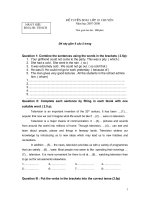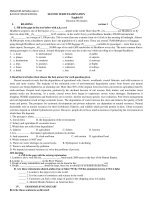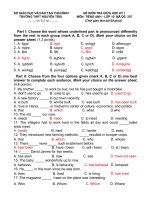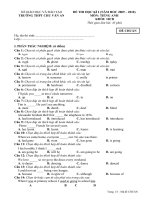de thi tieng anh-lop 10
Bạn đang xem bản rút gọn của tài liệu. Xem và tải ngay bản đầy đủ của tài liệu tại đây (70.46 KB, 15 trang )
®Ò sè 1 (60 phót)
I/ Choose the word whose underlined part is pronounced differently.
1. A. campus B. practice C. language D. favorite
2. A. school B. scholarship C. children D. chemistry
3. A. whether B. winter C. warm D. wrong
4. A. head B. meat C. bread D. dead
II/ Put the verbs in brackets into correct tense.
1. When we (be) small, our family (live) in the countryside.…………… …………
2. – A: Miss Trang is in hospital.
– B: Yes, I know. I (visit) .her tomorrow.……………
3. I (read) an interesting book at the moment. I (lend) it to you when I…………… …………
finish it.
4. While my father (repair) his car, my mother (cook) .in the kitchen.…………… …………
5. We (live) here since we were small.………………
6. If I (be) .you, I (help) her.…………………… ………………
III/ Write the second sentence so that it has a similar meaning to the first.
1. Somebody has just cleaned the room.
- The room……………………………………………………………………………
2. I can’t buy a new bicycle because I don’t have enough money.
- If I ……………………………………………………………………………………
3. “I’ll give you my book this evening”. Lan said to me
- Lan said ………………………………………………………………………………
4. It’s a pity I can’t play the guitar well.
- I wish…………………………………………………………………………………
5. My mother spent three hours making a dress.
- It took…………………………………………………………………………………
IV/ Read the passage, and then choose the correct answers.
I live in the Middle East for a while, and when I went out, I had to obey the local custom of
wearing something over my head and wearing a dress that covered my whole body. At first, I
found it a real nuisance, but after a while, I got used to it and even started to like it. You feel really
secure, and also you don’t have to worry about what to wear all the time.
1. The writer .…………………………………
A. lives in the Middle East now. B. was constrained to wear national costome.
C. obeyed the local custom eagerly. D. wears traditional costume whenever she goes out.
2. The word “it” in the paragraph refers to…………………………
A. custom B. dress C. costume D. veil
Page 1
3. How did she feel about the costume at first?
A. annoyed B. secure C. excited D. interested
4. After wearing the costume for a while, the writer thought .……………………
A. it was practical B. it was secure C. it was very strong D. it was fashionable
5. Which of the following statements is not mentioned in the passage?
A. The national costume consists of a long dress and a veil.
B. After a while, the writer had become accustomed to wearing the costume
C. The writer felt confident and safe when she wore the costume.
D. The writer is a Muslim.
V/ Choose the underlined word or phrase (A, B,C, or D) that needs correction.
1. If you call me, I would help you to do your homework.
A B C D
2. It was a long time since we last talked to each other.
A B C D
3. Children enjoy to tell and listening to ghost stories, especially on Halloween night.
A B C D
-The end-
Page 2
Dap an: De so 1
I/ 1,0d (0,25d/ 1)
1. D 2. C 3. D 4.B
II/ 2.5d (0,25/ 1 ®.tõ ®óng)
1. were/ lived 2. am going to visit 3. am reading/ will lend
4. was repairing/ was cooking 5. have lived 6. were/ would help.
III/ 2,5d
1. The room has just been cleaned
2. If I had enough money, I would buy a new bicycle.
3. Lan said to me that she would give me her book that evening.
4. I wish I could play the guitar well
5. It took my mother three hours to make a dress.
IV/ 2,5d
1. A 2. C 3. A 4. B 5. C
V/ 1,5d
1. B 2. A 3. A
®Ò sè 2 (60 phót)
I/ Choose the word whose underlined part is pronounced differently.
1. A. man B. hand C. bag D. many
2. A. book B. took C. goose D. good
3. A. why B. where C. what D. who
4. A. subject B. student C. result D. lunch
II/ Put the verbs in brackets into correct tense.
1. I (not/ invite) her to my party because I (forget) .her phone number.…………… …………
2. Look! Our new teacher (come) She (have) .long, black hair.…………… …………
3. I (not/ see) Linh since my birthday party.…………………
4. Last night I (finish) my homework before I (phone) you.………………… ……………
5. Look at those black clouds! It (rain) .………………………
6. When I (visit) Ba, he (listen) to pop music.……………… ………………
III/ Write the second sentence so that it has a similar meaning to the first.
1. It’s a pity I can’t speak English fluently.
- I wish ………………………………………………………………………………
2. The last time we went to a cinema was two years ago.
- We haven’t ………………………………………………………………………
3. They are going to build a new supermarket here.
- A new supermarket …………………………………………………………………
4. Last night I didn’t watch that film so I couldn’t tell you.
- If I …………………………………………………………………………………
5. “What is the name of your school, Nam?” Ba said
- Ba asked ……………………………………………………………………………
IV/ Read the passage, and then choose the correct answers.
Britain is now a highly industrialized country and there are only 238.000 farms in the UK.
More and more farmers leave the land because they can not earn enough money to survive. Only
large farms are economic and because of this most British farms are big. They usually grow cereals
in the east of England and raise sheep and cows in the north of England and Scotland. The small
family farms often have to earn more money by offering bed and breakfast accommodation to
tourists.
Farming methods in Britain have also changed. Fields used to be quite small, divided by
hedges which were sometimes a thousand yearsold and full of wild flowers and birds. Many
hedges were pulled up to allow farmers to use modern machinery. Now most fields in England are
large by European standards.
1. British farmers give up working on their farms because……………………
Page 1
A. they are tired of the farm work. B. they can’t earn their own living by farming.
C. they want to continue to live. D. they are forced to leave the land.
2. Most British farms are big because……………………
A. they are plenty of abandoned land. B. farming is now industrialized.
C. small farms are uneconomic D. most British farmers are rich.
3. The small family farms often offer bed and breakfast accommodation to tourists………………
A. to show their friendship. B. because they want to have more tourists to their farms.
C. so that the tourists will return to their farm the next time.
D. in order to improve their earnings.
4. Fields on British farms were………………………
A. seperated from each other by hedges B. full of wild flowers and birds
C. a thousand years ago. D. all are correct
5. Which of the following is not true?
A. Industries are developed in Britain. B. Being farms are usually in the north of England.
C. Many hedges were pulled down for farmers to expand their farms.
D. Most fields in England are now larger than they used to be.
V/ Choose the underlined word or phrase (A, B,C, or D) that needs correction.
1. Some mistakes were made in the poster, but they might correct before you get back.
A B C D
2. My father said that he is leaving for Ha Noi the next day.
A B C D
3. Are you interesting in learning English?
A B C D
-The end-
Page 2
Dap an: De so 2
I/ 1,0d
1. D 2. C 3. D 4. B
II/ 2,5d
1. didn’t invite/ forgot 2. is coming/ has 3. haven’t seen
4. had finished/ phoned 5. is going to rain 6. visited/ was listening
III/ 2,5d
1. I wish I could speak E fluently.
2. We haven’t gone to a cinema for 2 years.
3. A new supermarket is going to be built here.
4. If I had watched that film, I would have told you.
5. Ba asked Nam what the name of his school was.
IV/ 2,5d
1.B 2. C 3. D 4. D 5. C
V/ 1,5d
1.D 2. B 3. B
®Ò sè 3 (60 phót)
I/ Choose the word whose underlined part is pronounced differently.
1. A. mother B. some C. home D. nothing
2. A. since B. children C. live D. smile
3. A. those B. thin C. bath D. anything
4. A. feather B. meat C. heat D. seat
II/ Put the verbs in brackets into correct tense.
1. –A: How long you (know) Mr John?…………………
-B: I (know) him for five years.…………………
2. Lan should (practise) .speaking English every day.……………
3. My uncle (not/ visit) us since he (move) to the new town.……………… ……………
4. We (have) a party next Sunday. Would you like to come?…………………
5. Nam (dig) the holes to plant trees in the garden while his brother (watch) .TV.……………… ……
6. Last Sunday, my father (come) .back after I (finish) cleaning my house.………… ………………
III/ Write the second sentence so that it has a similar meaning to the first.
1. “Please turn down the radio for me,” said my father.
- My father told ……………………………………………………………………………
2. It’s three years since I last spoke to her.
- I haven’t……………………………………………………………………………………
3. They built this school in 1990.
- This school .…………………………………………………………………………………
4. I can’t tell you because I don’t know the truth.
- If I …………………………………………………………………………………………
5. It’s a pity I can’t swim far.
- I wish .……………………………………………………………………………………
IV/ Read the passage, and then choose the correct answers.
The use of computer and the Internet allows people to work at home instead of traveling to
work. For example, a journalist who lives in a remote part of the world still gets in his articles on
time for the next day’s newspapers. The Internet allows businesses to communicate with customers
and workers in any part of the world for the cost of a local telephone call. E.mail allows users to
send documents, pictures and other data from one part of the world to another in at least 5 minutes.
The Internet is providing a lot of new business opportunities. Some businesses are advertising their
products on the Internet. People can use the Internet to do shopping. This saves a lot of time. it is
possible to use the Internet for education – students may connect with their teachers from home to
send or receive e.mail or talk their problems through ‘on-line’ rather than attend a class.
Page 1
1. The use of computer and the Internet allows people…………………………
A. to stay at home and rest B. not to work C. to travel to work D. to work at home
2. The Internet is to communicate with people around the world.……………
A. a cheap way B. an expensive way C. an inconvenient way. D. a difficult way
3. Through the Internet, businesses can ………………………
A. buy godds from each other B. advertise and sell their products
C. send their products to customers. D. all are correct
4. It takes to do the shopping on the Internet.……………
A. a lot of time B. a little time C. less time D. more time
5. Which of the followings is true?
A. Thanks to the Internet, people do not need to go to work
B. E.mail can be used to advertise new products.
C. The Internet can be used for education
D. Students nowadays spend more time going online than attending school.
V/ Choose the underlined word or phrase (A, B,C, or D) that needs correction.
1. If I fly as a bird, I would travel every where I like.
A B C D
2. The house which Mary lived in as a child had an attic full of her grandmother’s old furniture.
A B C D
3. Last summer I have stayed on my uncle’s farm for two weeks.
A B C D
-The end-
Page 2
Dap an De so 3
I/ 1,0d
1. C 2. D 3. A 4. A
II/ 2,5d
1. have you known/ have known 2. practise 3. hasn’t visited/ moved
4. are going to have 5. was digging/ was watching 6. came/ had finished
III/ 2,5d
1. My father told me to turn down the radio for him.
2. I haven’t spoken to her for 3 years.
3. This school was built in 1990
4. If I knew the truth , I could tell you.
5. I wish I could swim far.
IV/ 2,5d
1. D 2. A 3. B 4. B 5. C
V/ 1,5d
1. A 2. A 3. B
®Ò sè 4 (60 phót)
I/ Choose the word whose underlined part is pronounced differently.
1. A. whisper B. while C. whole D. why
2. A. fast B. hard C. cat D. father
3. A. hour B. house C. horrible D. hair
4. A. proud B. around C. loud D. though
II/ Put the verbs in brackets into correct tense.
1. We (not/ phone) Lan since we (be) on holiday in Ha Long Bay.……………… ……………
2. I (meet) my close friend while I (do) .the shopping.……………… ………………
3. Mr Blair always (go) to work by bus.………………
4. He (travel) .to Germany next summer.……………………
5. Last night I (go) to Peter’s birthday party as soon as I (prepare) .………………… …………
the lesson.
6. If Mr Lam (visit) .Paris next week, he (see) the Eiffel Tower.……………… ……………
III/ Write the second sentence so that it has a similar meaning to the first.
1. Mr. Ba grows vegetables in his small garden.
- Vegetables……………………………………………………………………………
2. I don’t have free time so I can’t help you to do that work.
- If I …………………………………………………………………………………
3. “Did you attend Mai’s party last night, Minh?” Ba said.
- Ba asked………………………………………………………………………………
4. Huy began to collect stamps in 2000.
- Minh has …………………………………………………………………………
5. My mother can’t drive motor.
- I wish…………………………………………………………………………………
IV/ Read the passage, and then choose the correct answers.
Every year people in many countries learn English. Some of them are young children.
Others are teenagers. Many are adults. Some learn at school. Others study by themselves. A few
learn English just by hearing the language in films, on TV, in the office or among their friends. But
not many are lucky enough to do that. Most people must work hard to learn English.
Why do all these people learn English? It’s not difficult to answer this question. Many boys
and girls learn English at school because it is one of their subjects. Many adults learn English
because it is useful for their work. Teenagers often learn English for their higher studies because
some of their books are in English at the college or university. Other people learn English because
they want to read newspapers or magazines in English.
1. According to the writer .……………………………………………………
Page1
A. only young people learn English B. English is useful only for university students.
C. All people learn English at school D. English is popular all over the world
2. Most people learn English by…………………………………
A. watching films B. hearing the language on TV
C. working hard on the lessons D. speaking English to their friends
3. Many boys and girls learn English because .……………………………
A. it is included in their study courses. B. it’s useful for their higher studies
C. it’s their own language D. they are forced to learn it
4. Many adults learn English .…………………………
A. in order to be able to read newspapers in English B. because it helps them in their work.
C. because of their higher studies D. to communicate with their colleagues in the office.
5. Which of the followings is not mentioned?
A. English is widely used. B. English is a compulsory subject
C. English is spoken in the office D. English is the language of diplomacy.
V/ Choose the underlined word or phrase (A, B,C, or D) that needs correction.
1. I haven’t finished to decorate the Christmas tree yet.
A B C D
2. I don’t like people which talk too much.
A B C D
3. If I would have a lot of money, I would take a trip to space
A B C D
-the end-
Page 2
Dap an De so 4
I/ 1.0d
1. C 2. C 3. A 4. D
II/ 2,5d
1. haven’t phoned/ were 2. met/ was doing 3. goes
4. will travel 5. went/ had prepared 6. visits/ will see
III/ 2,5d
1. Vegetables are grown in Mr Ba’s small garden by him.
2. If I had free time, I could help you to do that work.
3. Ba asked Minh if he had attended mai’s party the night before.
4. Minh has collected stamps since 2000
5. I wish my mother could drive motor.
6.
IV/ 2,5d
1. D 2. C. 3. A 4. B 5. D
V/ 1,5d
1.B 2.C 3.A
®Ò sè 5 (60 phót)
I/ Choose the word whose underlined part is pronounced differently.
1. A. sight B. mineral C. pipe D. device
2. A. beach B. clean C. instead D. leave
3. A. work B. write C. weather D. walk
4. A. half B. honest C. history D. headache
II/ Put the verbs in brackets into correct tense.
1. –A: What you (do) . at the moment?……………………
-B: I (write) a letter to my parents. I (write) .them every week.……………… ……………
2. He (have) .these shoes since his eighteenth birthday.………………
3. I just (tidy) my desk, but now it’s in a mess again.……………
4. –A: Are you free on Friday?
-B: No, we’re very busy now. We (have) a party on Sunday.…………………
5. When I (visit) him, he (wash) his car.……………… …………………
6. Last weekend we (go) to the zoo after we (clean) our house.………………… ……………
III/ Write the second sentence so that it has a similar meaning to the first.
1. Ba said, “I’m going to meet your sister in front of the station, Liz.”
- Ba told………………………………………………………………………………
2. The last time she went out with him was two years ago.
- She hasn’t………………………………………………………………………
3. He is not on board now, so he can’t experience these marvelous things.
- If he .……………………………………………………………………………
4. The artists are painting a big picture in front of the Town Hall.
- A big .……………………………………………………………………………
6. Yesterday I didn’t go to the beach with my friends.
- I wish………………………………………………………………………………
IV/ Read the passage, and then choose the correct answers.
More than two hundred years ago, the term ‘environmental pollution’ was quite strange to
people. They lived healthily, drank pure water, and breathed fresh air. Nowadays,the situation is
quite different. People all over the world are worried about things that are happening to the
environment. Actually it is man that is destroying the surroundings with many kinds of wastes.
Everybody knows that motors and cars emit dangerous gases that cause poisonous air and cancer,
but no one wants to travel on foot or by bicycle. Manufacturers know that wastes from factories
make water and soil polluted, but they do not want to spend a lot of their money on treating the
wastes safely. Scattering garbage is bad for our health, but no one wants to spend time burying it.
Is it worth talking a lot about pollution?
Page1
1. More than two hundred years ago……………………
A. the environment was polluted as much as it is today
B. people knew nothing about environmental pollution.
C. air was polluted badly. D. people were faced with pollution.
2. Nowadays, many people are concerned about………………………
A. the poisonous air B. the polluted water
C. the wastes from the factories D. the environmental pollution.
3. According to the passage, people know that motors and cars emit dangerous gases .…………
A. so they do not travel by motors and cars B. so they prefer traveling by bicycles.
C. but they still prefer traveling by motors and cars D. and they enjoy traveling on foot.
4. Factory owners………………………
A. know nothing about pollution B. pollute water and soil
C. spend a lot of money on treating wastes D. don’t treat industrial waste safely
5. Which of the followings is not true?
A. In former days, people led a healthy life.
B. People have no awareness of the dangerous of pollution.
C. Water is now heavily contaminated by industrial waste.
D. It’s harmful for our health if rubbish is spreaded over our areas.
V/ Choose the underlined word or phrase (A, B,C, or D) that needs correction.
1. Peter told Mary to shut the door behind her but do not lock it.
A B C D
2. When I was ten, I could swim, but I wasn’t able dive.
A B C D
3. A student whom I met him last week is very intelligent.
A B C D
-The end-
Page 2
DAP AN DE SO 5
I/ 1.0d
1. B 2. C 3. B 4. B
II/ 2,5d
1. are you doing/ am writing/ write 2. has had 3. have just tidied
4. are going to have 5. visited/ was washing 6. went/ had cleaned
III/ 2,5d
1. Ba told Liz that he was going to meet her sister in front of the station.
2. She hasn’t gone out with him for 2 years.
3. If he was on board now, he could experience these marvelous things.
4. A big picture is being painted in front of the Town Hall by the artists
5. I wish I had gone to the beach with my friends yesterday.
IV/ 2,5d
1. B 2. D 3. C. 4. D 5. B
V/ 1,5d
1.D 2.D 3.B









